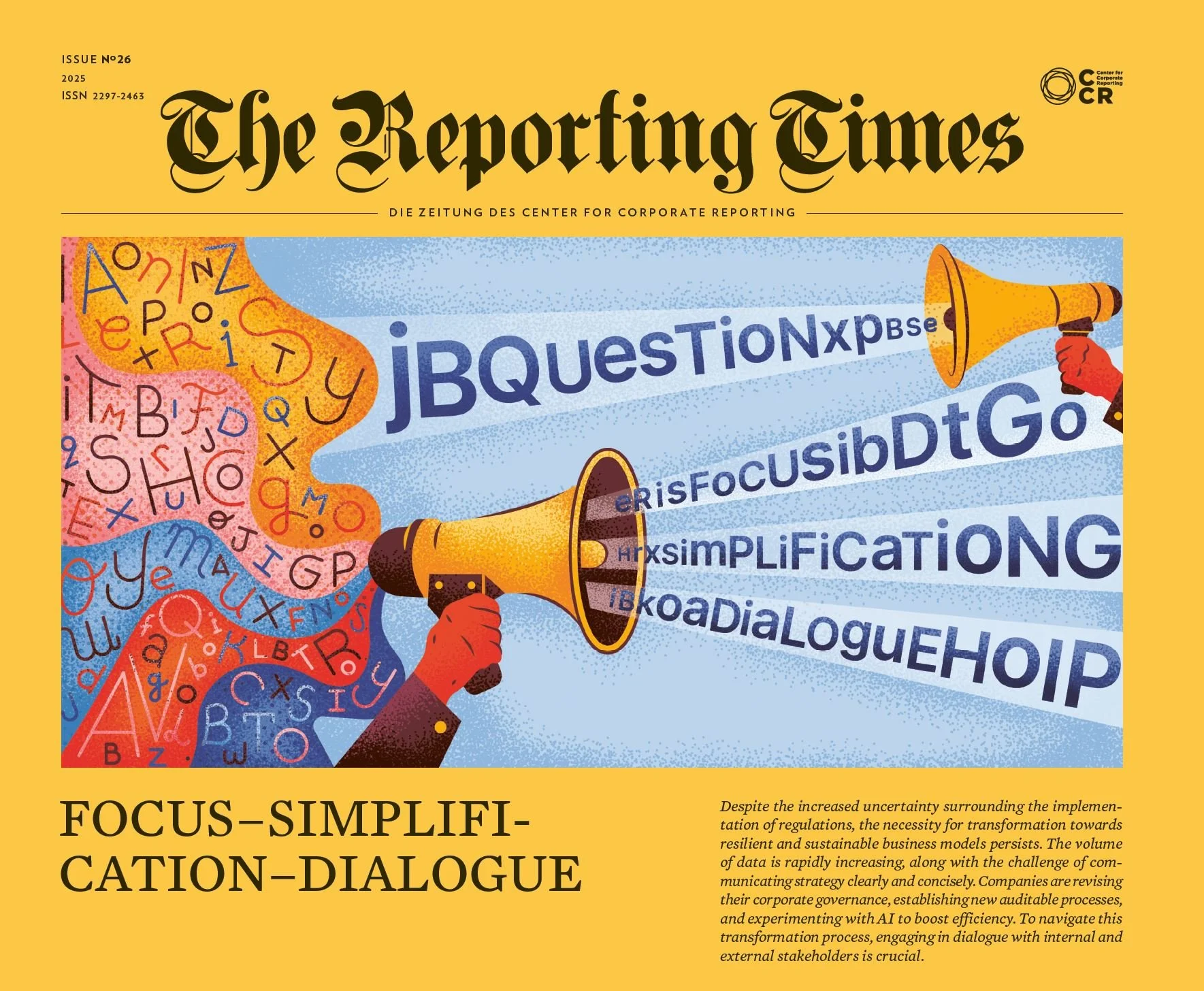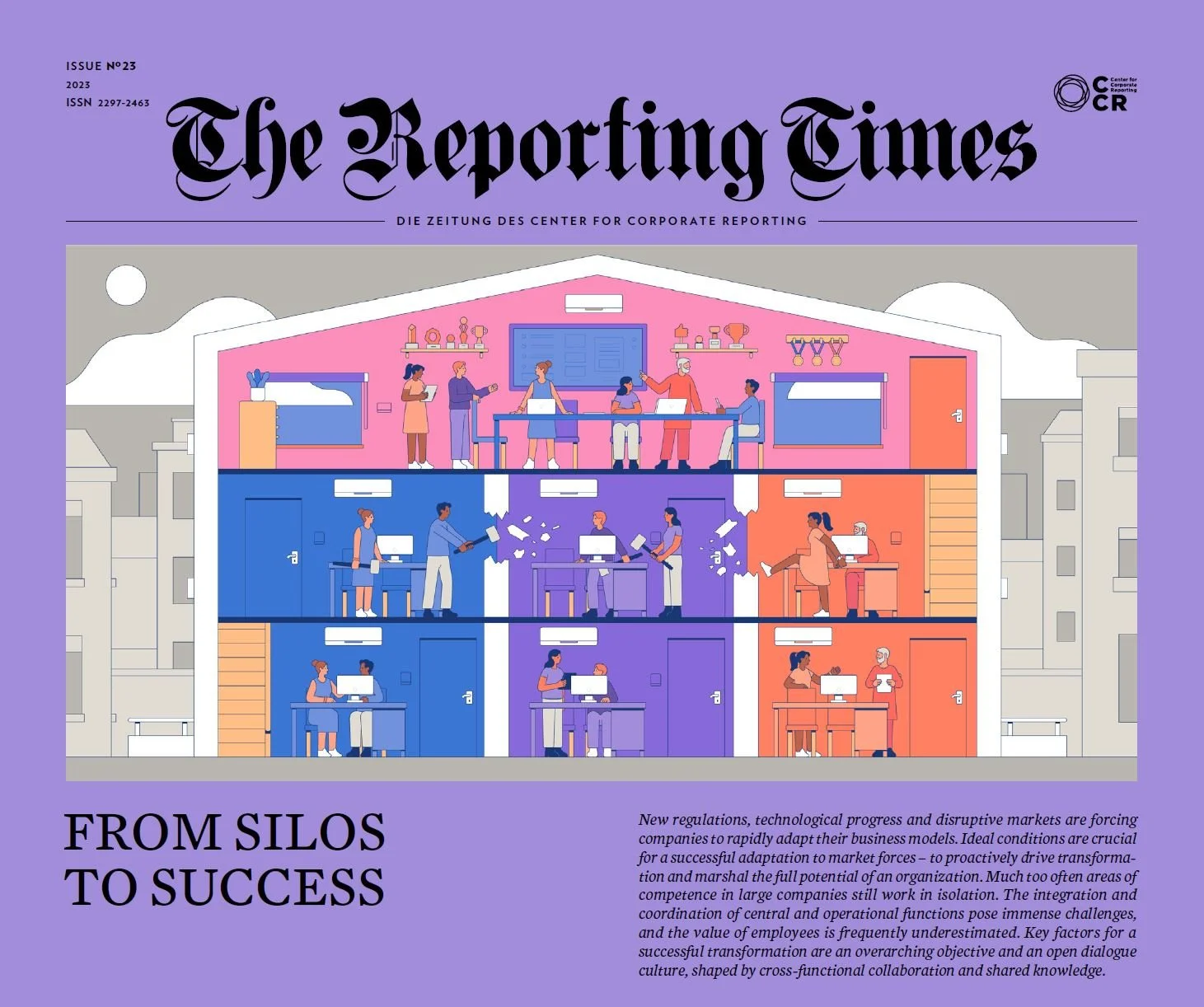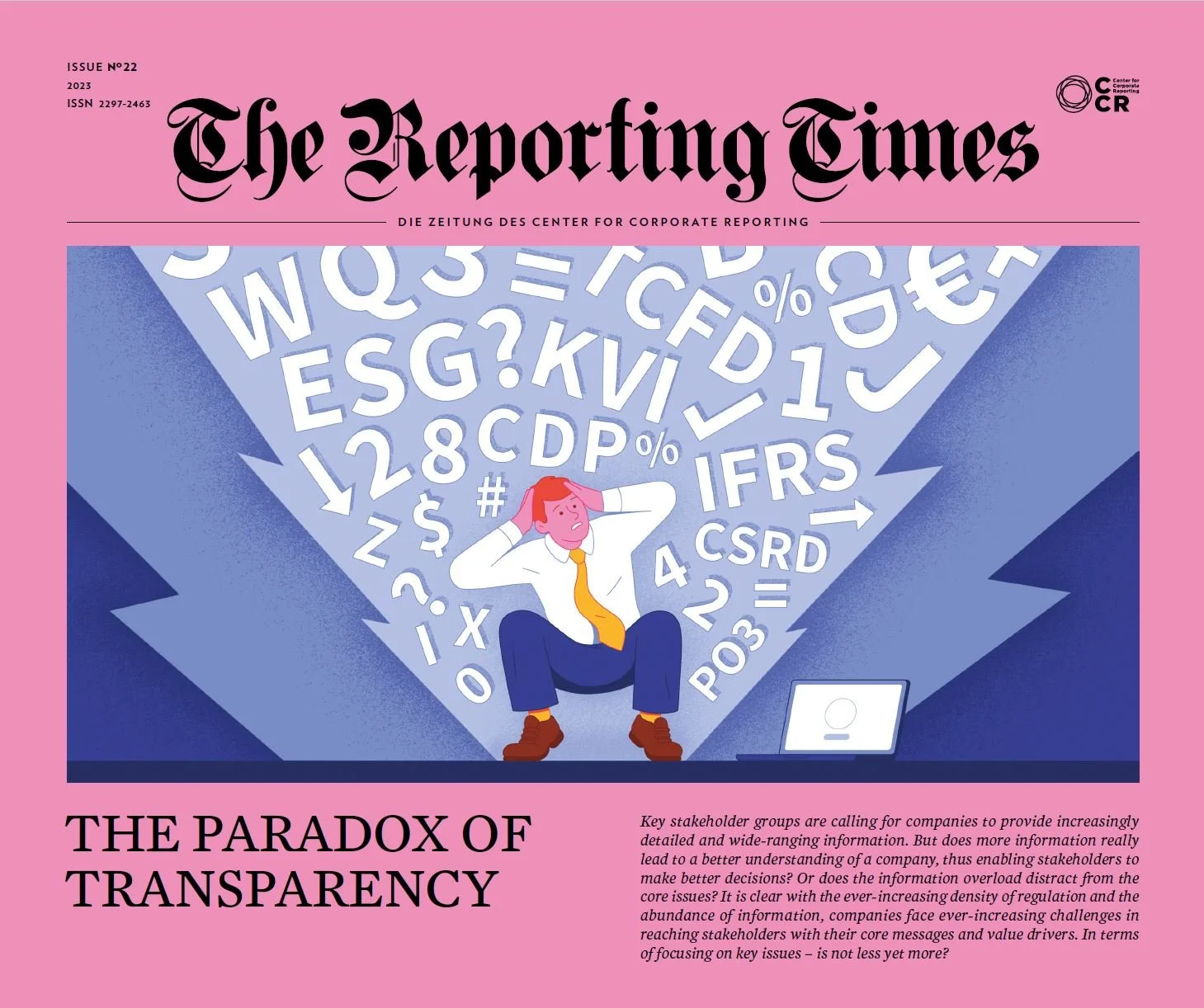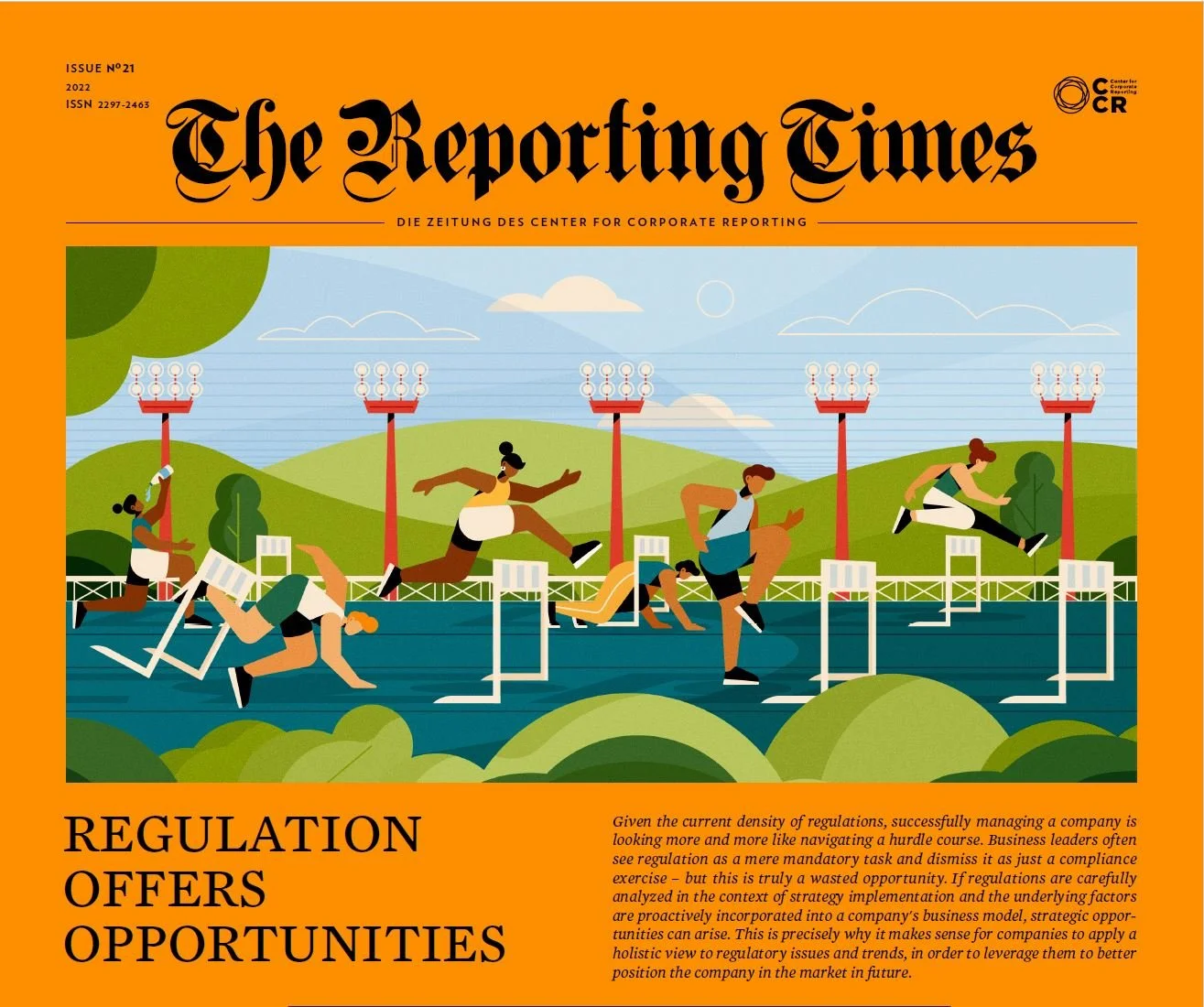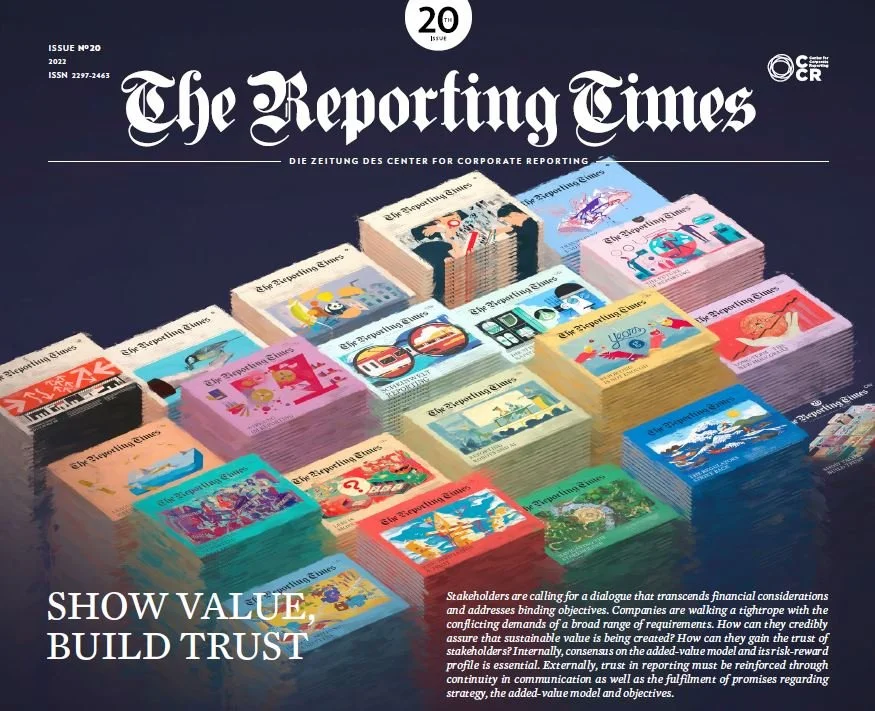The Reporting Times
Bisherige Ausgaben
After years of tightening regulations, a significant shift is beginning to take shape. Although regulatory pressures are easing, significant challenges still remain. Companies must now identify what truly matters, set clear priorities and direct their resources effectively to address the challenges regarding digitalization and sustainable transformation initiatives. In this new landscape, relevance must be earned. Strategic clarity isn’t optional – it’s essential for resilience and long-term success, as it fosters responsible decision-making and maximizes positive impact.
Despite the increased uncertainty surrounding the implementation of regulations, the necessity for transformation towards resilient and sustainable business models persists. The volume of data is rapidly increasing, along with the challenge of communicating strategy clearly and concisely. Companies are revising their corporate governance, establishing new auditable processes, and experimenting with AI to boost efficiency. To navigate this transformation process, engaging in dialogue with internal and external stakeholders is crucial.
2024 marks a milestone for the Center for Corporate Reporting (CCR): This is the 25th edition of “The Reporting Times” which is issued twice a year. The Geschäftsberichte-Symposium took place for the 15th time. And for ten years now, the CCR has been supporting its members as an independent knowledge platform. These successes are only possible thanks to the valuable support of the authors and speakers from business and academia, the readers of the CCR publications, the participants at the CCR Events, and last but not least, the loyal members and committed partners. Thank you for all the dialogue and trust!
The regulator only intervenes when voluntary initiatives fail. Since many companies have only made modest progress to date in transforming their business models, new waves of regulation have emerged. When compliance is regarded merely as a tick-the-box exercise, this great effort is wasted. Stakeholder requirements already go far beyond the legal minimum in many areas. Companies should see this transformation as an opportunity to align strategy, business model and governance, in order to gain a competitive advantage and sustain long-term success.
New regulations, technological progress and disruptive markets are forcing companies to rapidly adapt their business models. Ideal conditions are crucial for a successful adaptation to market forces – to proactively drive transformation and marshal the full potential of an organization. Much too often areas of competence in large companies still work in isolation. The integration and coordination of central and operational functions pose immense challenges, and the value of employees is frequently underestimated. Key factors for a successful transformation are an overarching objective and an open dialogue culture, shaped by cross-functional collaboration and shared knowledge.
Key stakeholder groups are calling for companies to provide increasingly detailed and wide-ranging information. But does more information always lead to a better understanding of a company, thus enabling stakeholders to make better decisions? Or does the information overload distract from the core issues? It is clear, with the ever-increasing density of regulation and the abundance of information, companies face ever-increasing challenges in reaching stakeholders with their core messages and value drivers. In terms of focusing on key issues – is not less yet more?
Given the current density of regulations, successfully managing a company is looking more and more like navigating a hurdle course. Business leaders often see regulation as a mere mandatory task and dismiss it as just a compliance exercise – but this is truly a wasted opportunity. If regulations are carefully analyzed in the context of strategy implementation and the underlying factors are proactively incorporated into a company's business model, strategic opportunities can arise. This is precisely why it makes sense for companies to apply a holistic view to regulatory issues and trends, in order to leverage them to better position the company in the market in future.
Stakeholders are calling for a dialogue that transcends financial considerations and addresses binding objectives. Companies are walking a tightrope with the conflicting demands of a broad range of requirements. How can they credibly assure that sustainable value is being created? How can they gain the trust of stakeholders? Internally, consensus on the added-value model and its risk-reward profile is essential. Externally, trust in reporting must be reinforced through continuity in communication as well as the fulfilment of promises regarding strategy, the added-value model and objectives.
Today’s challenges, such as climate change, need to be addressed by the community. All stakeholders have to contribute. To drive and accelerate change, regulators around the world have taken action to force companies to report on their short-, medium- and long-term impacts. In this way, regulators are enforcing consistent, transparent and comparable, relevant non-financial KPIs. This allows stakeholders to get a holistic picture of companies. It is in the companies’ own interest that all stakeholders work together constructively to find effective and efficient solutions.
Sustainability and digitalization are megatrends fundamentally transforming the society. Stakeholders challenge the focus on shareholders only. Objectives and a coherent strategy are key for a constructive dialog with stakeholders. Businesses are called upon to navigate the jungle of differing expectations. Management is accountable for integrating the interests of stakeholders in strategic planning. Digitalization enables companies to automatize processes and permanently monitor reporting, and it opens up new opportunities for data collection and data analysis.
Running a business always entails seizing opportunities and taking calculated risks. Stakeholders expect companies to recognize the impact of their business activities and manage it proactively. In a digital networked world missteps and lack of transparency lead to a loss of trust and reputation, since companies can be judged in real time across all channels. Trust and reputation form a solid foundation – in good times and bad.
Generating profits alone is not enough. Companies need to fully understand, manage and communicate the positive and negative impacts of their business activities in economic, ecological and social terms – as investors integrate ESG criteria into their investment decisions and regulatory bodies worldwide accelerate the push for sustainable economic development. Creating long-term value while incorporating a balance of stakeholder interests into the business model opens up future opportunities, helps identify risks early on and fosters innovation. Just who in the company needs to take on accountability for this: owners, boards of directors, management?
Legend describes the Holy Grail as a source of bliss, as a bearer of endless fulfilment and wealth – in short: as a solution to all problems. Is the declaration "long-term" the answer to all challenges in the world of leadership, strategy and reporting? Sustainable economic growth, sustainable value creation in the company and sustainable relationships with stakeholders: how can this long-term primacy be reconciled with an agile business environment in which a high degree of uncertainty prevails and quick decisions are required?
The 10th Geschäftsberichte-Symposium! Who would have thought it possible? An annual professional event has evolved into a membership-based center of excellence – the Center for Corporate Reporting (CCR). Let’s take a journey through the CCR universe – perhaps you remember a highlight here or there from ten years of knowledge and networking (p. 16 &17)? We look forward to raising a glass with you at the Anniversary Symposium!
Our cars drive autonomously and we telephone with chatbots without being aware of it. We read sports or weather news written by “thinking” machines. We consult a “robo-doctor” in case of illness and rely on his remote diagnosis. Artificial Intelligence (AI) penetrates all areas of life – faster than we think. Will we soon be displaced by a robot at our workplace? What does AI mean for reporting or the audit process and how is it used by investors who need to make investment decisions?
Is less really more? This issue addresses the conflicting concerns of growing complexity driven by constant new regulatory requirements and numerous stakeholder demands for evermore specific information, and the need to sharpen the focus on information that is material. What kind of concepts are able to meet these challenges? Issue no. 12 features the concepts, new approaches and technologies whose goal it is to deal with a reporting world steadily becoming more complex.
One of the world’s most influential investors, Warren Buffett, once said that he only considers investing in a company if it has an easy-to-understand business model. This clearly reflects an integrated thinking approach. Companies are becoming increasingly aware that reports with unconnected chapters, a strong focus on the past and only financial KPIs are no longer sufficient. They are veering toward Integrated Reporting and placing their business model at the core, while including material opportunities and risks in their strategic framework. Moreover, they are connecting material financial and non-financial information and addressing interrelatedness and dependencies. Typically, they are also focusing on long-term value creation. This issue will pick up many aspects that shape today’s Integrated Reporting.
The future starts now – this broad claim could not be any less true for corporate reporting. Report makers and shapers are already looking ahead as they are under intense scrutiny from their investors, customers, standard setters, national and supranational regulators, and NGOs. Technical innovations like digitalization, automatization, big data, and artificial intelligence, coupled with social developments related to individualization, purpose, sustainability consciousness, and global connectedness, pose challenges and yet open up opportunities for companies at the same time. Our celebratory issue No. 10 will try to offer relevant kick-starts for fruitful discussions on transparent, relevant, and meaningful future reporting.
Die Berichterstattung von Unternehmen wird immer aufwändiger, komplexer, umfangreicher – aber auch relevanter? Online oder Print, integriert oder getrennt, finanziell oder nichtfinanziell, komprimiert oder umfassend – die Entscheidungen, die Unternehmen strategisch und konzeptionell zu treffen haben, sind nicht wenige. Die Frage jedoch ist: Was will der Kapitalmarkt als die wesentliche Zielgruppe der Unternehmensberichterstattung? Die Anforderungen von Analysten und Investoren gleichen einer Black Box – jedenfalls aus Unternehmenssicht. Die vorliegende Ausgabe von «The Reporting Times» will «Licht ins Dunkel» bringen.
Im Spannungsfeld von Regulation, Stakeholder-Erwartungen und Eigeninteressen kommt es leicht zu Verzerrungen und zur Errichtung einer Scheinwelt. Diese mag Unternehmen kurzfristig nützen, Authentizitätsverlust und geringes Vertrauen in die Unternehmensführung können jedoch langfristig erheblichen Schaden anrichten. Dem Phänomen Scheinwelt und geeigneten Gegen-Strategien gehen Autoren in dieser Ausgabe von «The Reporting Times» nach. Inspiration und praktische Impulse zum Thema verspricht auch das Geschäftsberichte-Symposium am 9. Juni in Zürich.
Ob in Corporate Finance, Communications, Governance oder Investor Relations: Je höher der Aufwand, der für Reporting betrieben wird – und aufgrund von Regularien und Standards betrieben werden muss –, desto mehr interessiert die Fachleute die Wirkung. Die aktuelle Ausgabe von «The Reporting Times» geht den Wirkungsmechanismen in der Berichterstattung auf den Grund und den Hebeln, die zu betätigen sind, um das gewünschte Resultat zu erzielen
Die Steuerung eines Unternehmens vorbei an den Klippen einer globalisierten Wirtschaft erfordert ein ganzheitliches Verständnis der eigenen Wertschöpfungsprozesse und den Dialog mit den Anspruchsgruppen. Das Reporting spielt dabei eine zentrale Rolle. «Leadership Matters» ist das Thema dieser Ausgabe von «The Reporting Times» und des Geschäftsberichte-Symposiums am 11. Juni 2015.
Führt eine verordnete Öffnung der Informationsschleusen zu mehr Verständnis bei den Stakeholdern oder zu mehr Disziplin in den Unternehmen, zum Beispiel bei den Vergütungen? Wer soll Schleusenwärter sein: der Staat, die Fachgremien mit ihren Empfehlungen? Orientieren sich Unternehmen besser an nationalen oder internationalen Standards? Mit solchen Fragen befassen sich die Autorinnen und Autoren der «Reporting Times» in der vorliegenden Ausgabe.
Unternehmen stehen vermehrt Gruppen oder einzelnen Individuen gegenüber, die ihren Einfluss direkt oder über die sozialen Medien geltend machen. Der Anspruch an die Unternehmen, sich als «good citizens» zu verhalten und transparent zu berichten, wächst. Das ist das Thema des kommenden Geschäftsberichte-Symposiums



